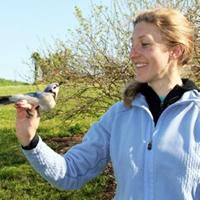
Tapping into Big Data to Learn More about a Superhighway for Migratory Birds

Danica Schaffer-Smith, a Ph.D. candidate in the Nicholas School of the Environment, received a grant to participate in a week-long workshop on environmental data analytics in Boulder, Colorado, offered by the National Center for Atmospheric Research (NCAR) and National Ecological Observatory Network (NEON). The technical knowledge she gained will inform her dissertation on spatiotemporal variability of inland waterbodies along the Pacific flyway. More than a billion birds use this flyway every year as a north-south migration route.
She was among 19 Duke students who received Graduate Student Training Enhancement Grants in 2016-17 for training beyond their core disciplines. Her faculty mentor was Jennifer Swenson. Recently she reflected on her experience:
The workshop brought together 25 graduate students and senior scientists in environmental statistics and related fields to explore contemporary topics in applied environmental data modeling with the intent to “prepare the next generation of researchers and practitioners to work within, and contribute to, the data-rich era.”
Students and organizers engaged in hands-on computing and modeling tutorials focusing on climate data analytics, Bayesian statistics and modeling for environmental and ecological data and hierarchical models for spatiotemporal data. Students applied the workshop material to group projects using real environmental datasets and presented preliminary findings at the end of the week.
We visited the NEON facility in Boulder. The visit consisted of presentations from researchers engaged in data collection and analysis as well as tours of different parts of the facility, which is responsible for maintaining consistency across the nationwide network of NEON including calibrating all sensors used in the research program.
Participants also had the opportunity to network during and after workshop hours. Additional activities included a group walking tour of Boulder, visiting the public exhibits at the NCAR Boulder Mesa Facility and hiking in the Flatirons above Boulder.
Participating in the workshop assisted me in developing new modeling and computing skills, including an emphasis on big data and integrating diverse datasets in a unified analysis framework. The tutorials on Bayesian data analysis and spatiotemporal data analysis have proven to be directly applicable for my own work and I am currently using these methods in two chapters of my dissertation. Activities also provided insight into the wealth of data and resources available through NCAR and NEON, which I may be able to leverage in future research endeavors.
Furthermore, the workshop permitted me to work closely with instructors from NCAR, Oregon State University and Michigan State University in addition to a multidisciplinary cohort of 24 students from other institutions, with whom I may have opportunities to collaborate.
This internal funding mechanism from the Office of the Vice Provost for Interdisciplinary Studies encourages graduate students to step away from their core research and training to acquire skills, knowledge or co-curricular experiences that will give them new perspectives on their research agendas. Graduate Student Training Enhancement Grants are intended to deepen preparation for academic positions and other career trajectories.
Image: Demonstration sensor array at NEON facility in Boulder; payload for NEON’s aerial remote sensing data collection, including LiDAR, and high-resolution aerial photography